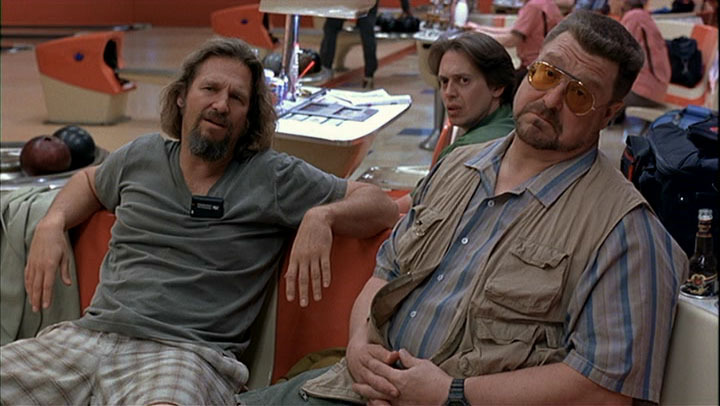As an avid fan of the Coen brothers’ work, it may seem odd that I waited 12 years after its initial theatrical release to see their film which claims the most passionate devotees. There is good reason for this, and let’s get that bit out of the way before we continue.
 The Big Lebowski contains humorous drug and alcohol use, shocking violence, graphic nudity and sexuality, and more foul language than Interstate 5 during rush hour. Be warned. Is it funny? Uproariously. Is it engaging? Absolutely. Is it well acted? Without a doubt. In fact, if you can stand the profane, and if you are willing to think deeply about a movie involving a scene from the point of view of a bowling ball, I dare say you might be moved.
The Big Lebowski contains humorous drug and alcohol use, shocking violence, graphic nudity and sexuality, and more foul language than Interstate 5 during rush hour. Be warned. Is it funny? Uproariously. Is it engaging? Absolutely. Is it well acted? Without a doubt. In fact, if you can stand the profane, and if you are willing to think deeply about a movie involving a scene from the point of view of a bowling ball, I dare say you might be moved.
The Big Lebowski is a noir film at heart set in modern day
Interspersed throughout the story are a hodge-podge of eccentric characters and absurd situations. The Dude flies over
If that sounds like a cornucopia of meaningless confusion, that’s because it almost is.
 It’s almost also infinitely quotable and referenceable. In the years since The Big Lebowski’s original release, the film has become a cult classic of epic proportions. I recognized lines from this film as characters said them, and as I said, I had never seen it and knew almost nothing about it. Annual Lebowski Fests are held around the world where admirers of the Dude drink white Russians and bowl while quoting the movie to one another. Tomes have been written about this film with titles like “The Dude Abides: The Gospel According to the Coen Brothers” and “The Tao of the Dude.”
It’s almost also infinitely quotable and referenceable. In the years since The Big Lebowski’s original release, the film has become a cult classic of epic proportions. I recognized lines from this film as characters said them, and as I said, I had never seen it and knew almost nothing about it. Annual Lebowski Fests are held around the world where admirers of the Dude drink white Russians and bowl while quoting the movie to one another. Tomes have been written about this film with titles like “The Dude Abides: The Gospel According to the Coen Brothers” and “The Tao of the Dude.”
Clearly, the film isn’t “a cornucopia of meaningless confusion,” or if it is, perhaps it is very meaningful “meaningless confusion” to a large number of people. Why?
Well, The Big Lebowski is in many ways a random, nonsensical film. There is very little rationality to the working out of the plot, and the characters are absurd. But that’s just it. In that way, the film mirrors life. Life does often seem random and nonsensical. People do act absurd.
 And through it all, “The Dude abides.” Sure, he fights back (“This aggression cannot stand, man!”). Sure, he mourns loss. But through it all, he lives. He laughs. He abides.
And through it all, “The Dude abides.” Sure, he fights back (“This aggression cannot stand, man!”). Sure, he mourns loss. But through it all, he lives. He laughs. He abides.
This is not a new theme for Coen brothers. In fact, this is the principal theme in all their work. From Blood Simplethrough A Serious Man, Joel and Ethan Coen have searched for hope amidst meaninglessness. The Dude is the embodiment of the hope that they have found, a hope also found in the book of Ecclesiastes whose words are written in stone upon the wall of the mortuary the Dude visits just before his story resolves.
--Elijah Davidson
No comments:
Post a Comment